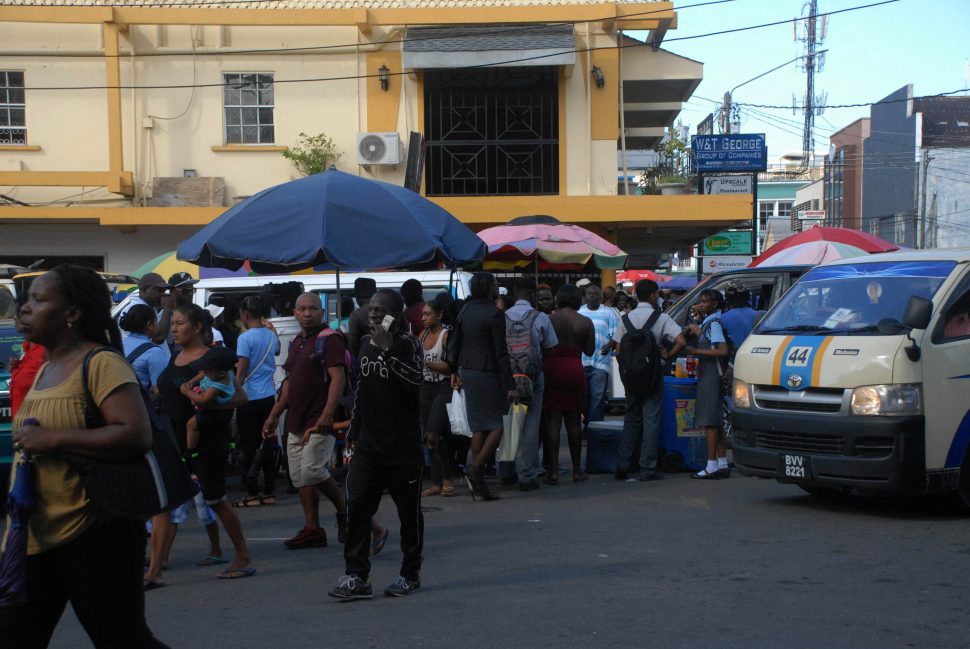There is still no telling how much longer it will take for a Code of Conduct for Minibus Operators to materialise, notwithstanding the evident urgency of the need to raise service delivery standards in the privately- run public transport sector.
Inquiries by this newspaper with both the Ministry of Business and the United Minibus Union – the two prime movers behind the promised Code of Conduct – have yielded no timelines for its introduction. Numerous commuters with whom this newspaper has spoken insist that such a code is now badly needed in light of the unchecked indiscipline, even lawlessness, which has long pervaded the sector.
Attempts to bring radical change to what is widely held to be a toxic service culture in the public transport industry have long been undermined mostly on account of less-than-effective enforcement which is widely believed to be a function of ineffective policing.
While it is unclear just how much progress has been made in this regard, Stabroek Business has seen a copy of an unsigned draft ‘Code of Conduct for Minibus Operators and Other Personnel’ to which the United Minibus Union, the Ministry of Business (Department of Consumer Affairs), the Guyana Police Force and the National Road Safety Council are the intended signatories. The document “Code of Conduct” itself outlines both the “purpose” as well as the “rules and regulations” of a Code of Conduct, addressing areas such as licencing and compliance, customer service, prohibitions, health and safety, fines, supervision of the Code and enforcement.
Some of the key issues that have generated the widespread opprobrium which the sector has attracted including the “playing of loud and offensive music”, drinking and driving by drivers and texting or otherwise using a phone while driving, are listed under the “Prohibitions” section of the Code while under the same section minibus crews can be sanctioned for refusing to stop the vehicle at a designated ‘bus stop’. The draft also makes the placing of signs “that would offend any group or individual” inside or outside the minibus a punishable offence.
Meanwhile, the document also alludes to the requirement that “minibus personnel” observe “public transport-related laws and regulations and to demonstrate tolerance whilst desisting from prejudice and impartiality.”
The “Health and Safety” section of the draft addresses a range of issues including the cleanliness of the interior of minibuses and the obligation of minibus crews to conduct daily checks of mechanical parts of the vehicles including engines, brakes and tyres. The crews must also ensure that the interiors of buses are of such that they not cause injury to passengers, adhere to the prescribed speed limits, equip buses with fire extinguishers, not fuel buses with passengers on board and not overload buses.
What remains unclear, however, is the manner in which a Code of Conduct will be enforced in all of its various aspects though the document seen by this newspaper says that the United Minibus Union “shall ensure the implementation of the Code with support from the Guyana Police Force.”
Some of the commuters with whom the Stabroek Business have spoken were insistent that if the police are to be effective in its role as an enforcer of a Code of Conduct for minibus operators, traffic ranks must first put an end to what one commuter described as “its own corrupt relationship” with minibus operators which she said “is more important to them than ensuring that commuters benefit from a ‘safe and comfortable service’.”
While the document seen by this newspaper names the Union as being responsible for the implementation of the Code and accords the police a “support” role, a source close to the discourse on the implementation of the Code has raised doubts as to whether the Union has the capacity to ensure effective implementation and effective oversight given the fact that it is not known to have the facilities with which to do so.










